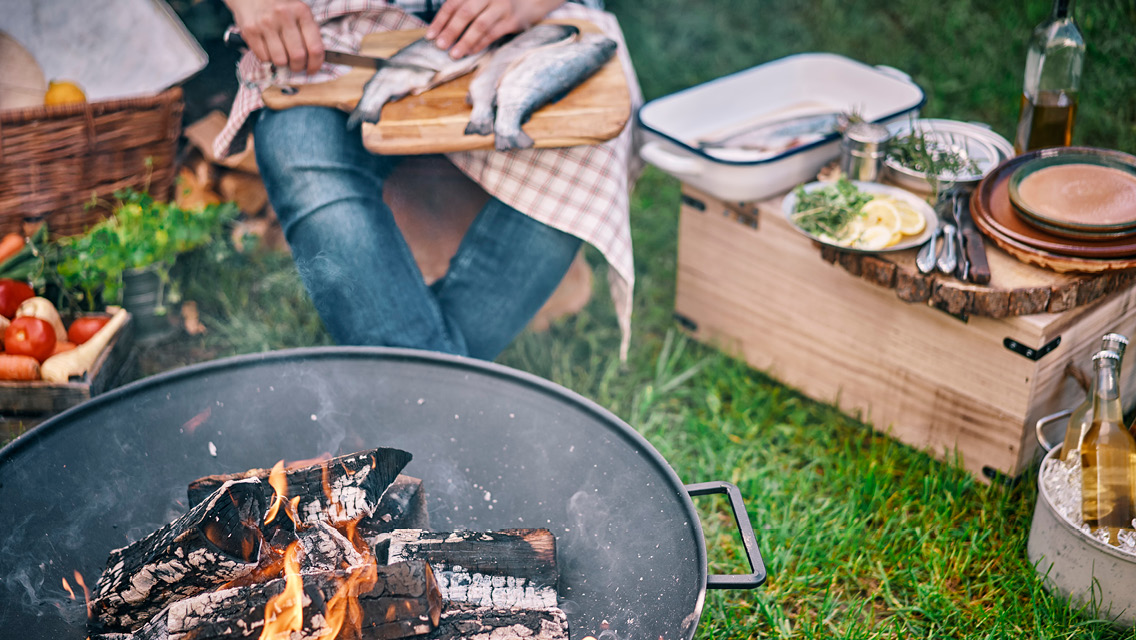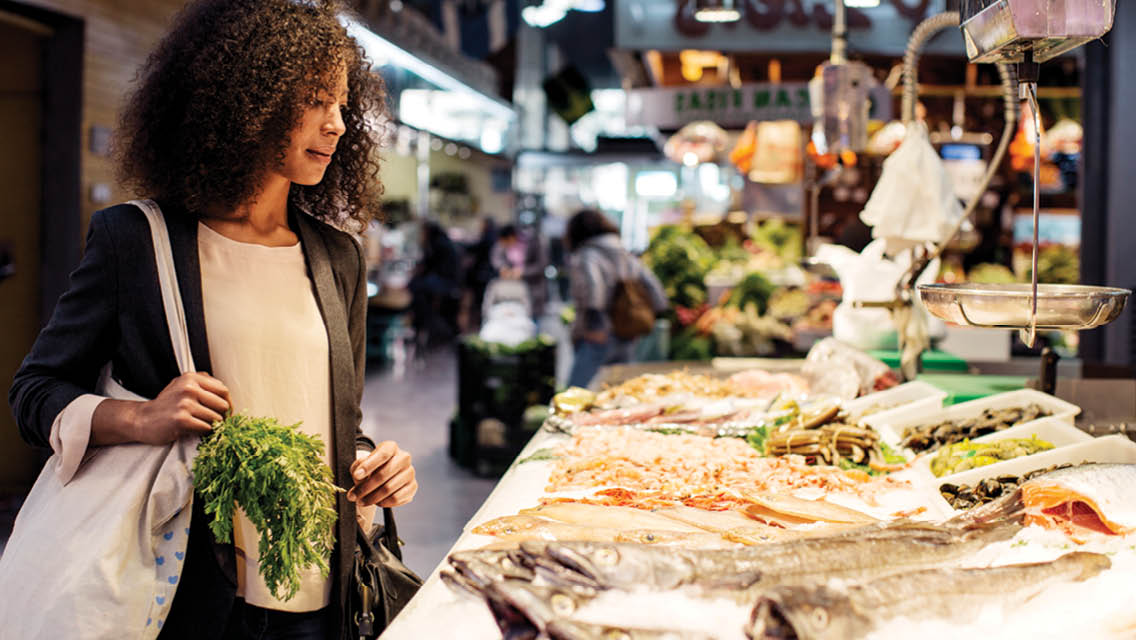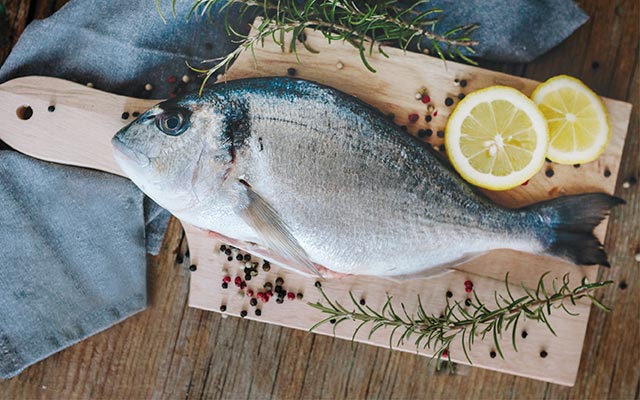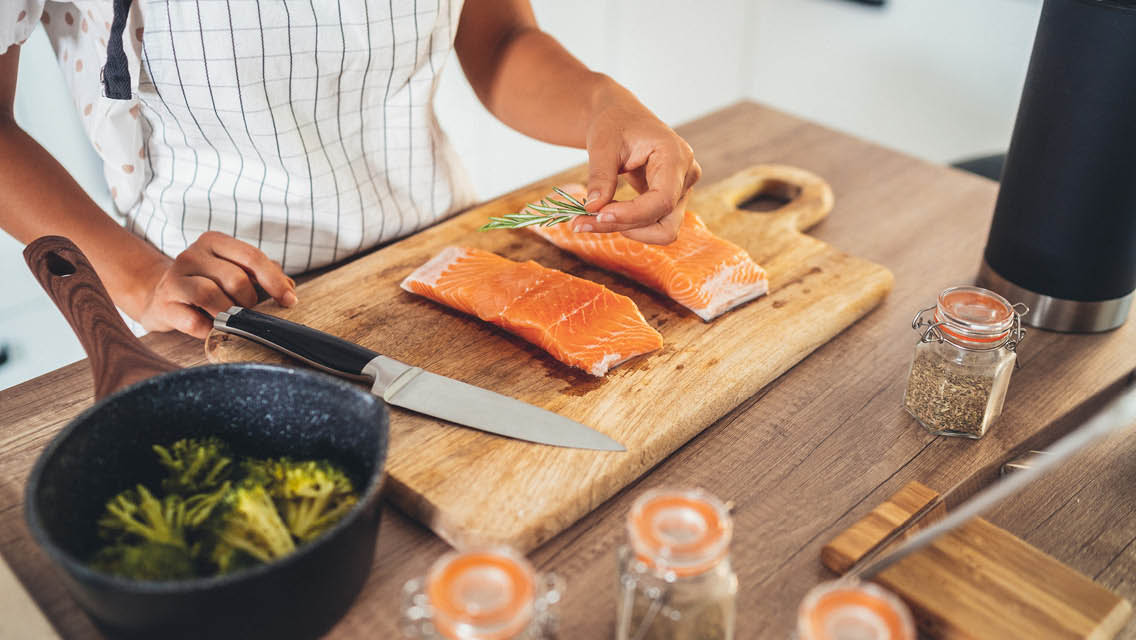ARTICLE SHORTCUTS
Who doesn’t love to grill? It’s quick and easy and gets you out of the kitchen and into the backyard. Of course, as anyone can probably attest, grilling can be tricky at times. Doing it well requires a certain know-how. Otherwise food falls through the grill or turns out charred on the outside, undercooked on the inside.
My solution? Keep it simple and healthy by relying on classic Latin and Mediterranean seafood techniques. Don’t get me wrong: I love grilling pork, poultry and red meat, but when it comes to efficiency, fish rules. Most species of fish average just a little more than a hundred calories for a 6-ounce portion. Even fish with higher oil content, such as mackerel or salmon, still top out at just less than 350 calories for a 6-ounce fillet and they offer a good dose of healthy omega-3 fatty acids in the bargain.
Smoke Alarm
If grilling has one drawback, it’s the potential buildup of heterocyclic amines (HCAs) and polycyclic aromatic hydrocarbons (PAHs). HCAs are created when the amino acids from muscle meats are burned at high temperatures. PAHs, in comparison, enter the meat through the smoky flare-ups, which are caused when fat drips onto the coals (or flames in the case of gas grills). HCAs and PAHs can also form directly on food when it’s cooked too crisp. These chemicals are known to be carcinogens (cancer-causing), and while the question of how much cancerous cell damage they can do is up for debate, they should be avoided as much as possible. (See “How to Lower Grilled Meat’s Cancer Risk” for more.)
Fish, though, can take much less time to grill than other meats, so HCAs and PAHs don’t have as much time to build up. Also, since fish are leaner than other animal proteins, they won’t drip as much fat.
Studies have shown that marinating foods also reduces PAH and HCA formation by cutting down on flare-ups. The trick, though, is to keep the marinade on the light side, since soaking fish in too much of anything will always cause flare-ups. But if you marinate in lightly acidulated vinegars, herbs, spices, chilies, garlic or citrus, you can add big flavors and still keep your fish healthy.
Warm-weather European and Latin American cooks have grilled this way for millennia. Traditional Mayan kitchens on Mexico’s Yucatan Peninsula rely on achiote, lime, orange, garlic and hot peppers to marinate fish in the pibil style. Most Mediterranean countries use fresh herbs, garlic, lemon and just enough olive oil to moisten fish and create a delicious, delicate crust.
Another technique shared by both cultures is that they usually roast their fish whole, over medium heat, using an indirect source. You can duplicate this method (even if you are just cooking fillets) by pushing the coals to one side of the grill and laying the fish on the opposite end. If you’re cooking on a gas grill, try using only a few of your burners to create the heat you need (roughly 400 degrees Fahrenheit) and place the fish on the part of the grill where the burner is off. This not only eliminates all possibility of flaring but also allows you to grill-roast the fish, which creates a crisp crust without any blackening.
12 Fish Grilling Tips
- Use the freshest fish possible. If your recipe calls for swordfish, but the freshest catch at the fishmonger’s is walleye, then go with the walleye.
- Know where your fish comes from. Shop at a fish store with knowledgeable staff and ask questions: The farmed-versus-wild debate and use of sustainable fisheries are major concerns these days. I almost always prefer wild-caught seafood, but in many countries there are ecologically safe farm fisheries. Check out Monterey Bay Aquarium’s Seafood Watch list (www.montereyaquarium.com) for the best choices.
- Rinse and pat dry your fish when you get it home, then marinate or cook right away. Buying and cooking it the same day is always best, but fish can spend a day on ice if it’s fresh enough.
- Always keep your grill clean and the racks lightly coated with vegetable oil so foods cook properly and release easily. Keep spray bottles of water on hand for dousing flare-ups and olive oil or canola oil for lubricating sticky spots.
- Your frill is hot enough when you can’t hold your hand over the coals for longer than a second or two from 6 inches away.
- Firm, fatty fish like salmon is the easiest to barbecue. The toughest: fine-fleshed, flat ones (say that three times fast), such as flounder. Also, steaks are easier to grill than fillets.
- Marinating creates flavor and/or a crust, but overmarinating can turn your fish mushy or overwhelm its natural flavor. Marinating for just a few hours is plenty if you are using a strong rub, paste or liquid seasoning. Never marinate using papaya or pineapple, as they contain an enzyme that breaks down the flesh.
- Grilling time for whole fish varies between species, but a good rule to follow is 10 minutes for every inch of thickness.
- The fish should be flaky when cooked through, but some fish, such as salmon or tuna, are ideally cooked less than medium, and many people prefer them rare. White, firm-fleshed fish like snapper or halibut, while edible raw, tastes better when cooked just to the point of doneness.
- Use a bundle of tied rosemary as a brush for basting fish on the grill. When almost finished, toss the herb bundle on the coals and continue cooking, covered, for a few minutes to infuse the fish with an herb-smoked flavor.
- Stuff the lemon slices, fork-mashed garlic, and whole herb sprigs for an intense flavor boost.
- If you want a smokey flavor, soak dried grapevine cuttings, fruitwood chips or hardwood chips in water and then toss on the coals.
Recipe
Roasted Mayan-Style Whole Fish With Salsa Verde and Pickled Onions
One terrific approach for grilling fish is to use a rub or marinade followed up at the table with a great, healthy sauce.
The Mexican kitchen offers the best example of this one-two punch. I like using both the salsa and the onions on the table, along with fresh warm corn tortillas for dipping and wrapping. Serve this dish with lemonade, sangria, a pitcher of mojitos or ice-cold Dos Equis beer.
- 4 small whole red snappers or baby groupers; about 2 pounds each (have a fishmonger cut off the fins, but leave the head and scales)
- 6 tbs. achiote paste
- 3/4 cup fresh orange juice
- 2 tbs. fresh lime juice
- 3 garlic cloves, minced
- 1 small onion, minced
- 3 tbs. canola oil
Directions
- Combine the achiote paste, lime juice and orange juice in a blender. Purée and combine with the minced onion and garlic.
- Make three lateral slashes on each side of the fish at a 45-degree angle to the center bone of each fish. Rub the marinade all over and place in the fridge for eight to 12 hours. It can sit overnight if the fish is very fresh. Better yet – buy it in the morning, let it marinate for the afternoon and grill in the evening.
- Grill fish over indirect medium high heat for seven to eight minutes on each side, or roughly 10 minutes for each inch of thickness. Be sure to brush the grill and fish with canola oil to prevent sticking.
- When fish is cooked through, serve with the salsa, the onions and plenty of fresh warm corn tortillas.
Salsa Verde
- 2 garlic cloves
- 1 tsp. salt
- 1 small onion, minced
- 2 to 3 green chilies, jalapeños or serranos, minced
- 1/2 pound tomatillos, husked, rinsed and quartered
- 1 ripe avocado
- 3 tbs. fresh cilantro leaves
- 2 tbs. fresh lime juice
Directions
- Combine the chilies, onion, salt, garlic, tomatillos and cilantro in a mortar and pestle or in a food processor and grind to create a chunky paste.
- Peel, seed and chop the avocado, then fold it into the sauce with the lime juice.
- Season and serve quickly.
Pickled Onions
- 2 large red onions, shaved paper thin1 red bell pepper, sliced into thin strips
- 1 tbs. pickling spice
- 3 cups cider vinegar
- 1 1/2 cups natural unbleached sugar
Directions
- Place onions and peppers in a nonreactive bowl.
- Combine sugar, vinegar and spice in a small pan and heat slowly, stirring until sugar dissolves. Immediately pull from heat and let cool, never allowing the liquid to get very hot. Pour over the onions, cover and place in fridge for 24 hours. Use as an accompaniment for all grilled foods.
This article has been updated and originally appeared as “All Fired Up” in the June 2004 issue of Experience Life.





This Post Has 0 Comments